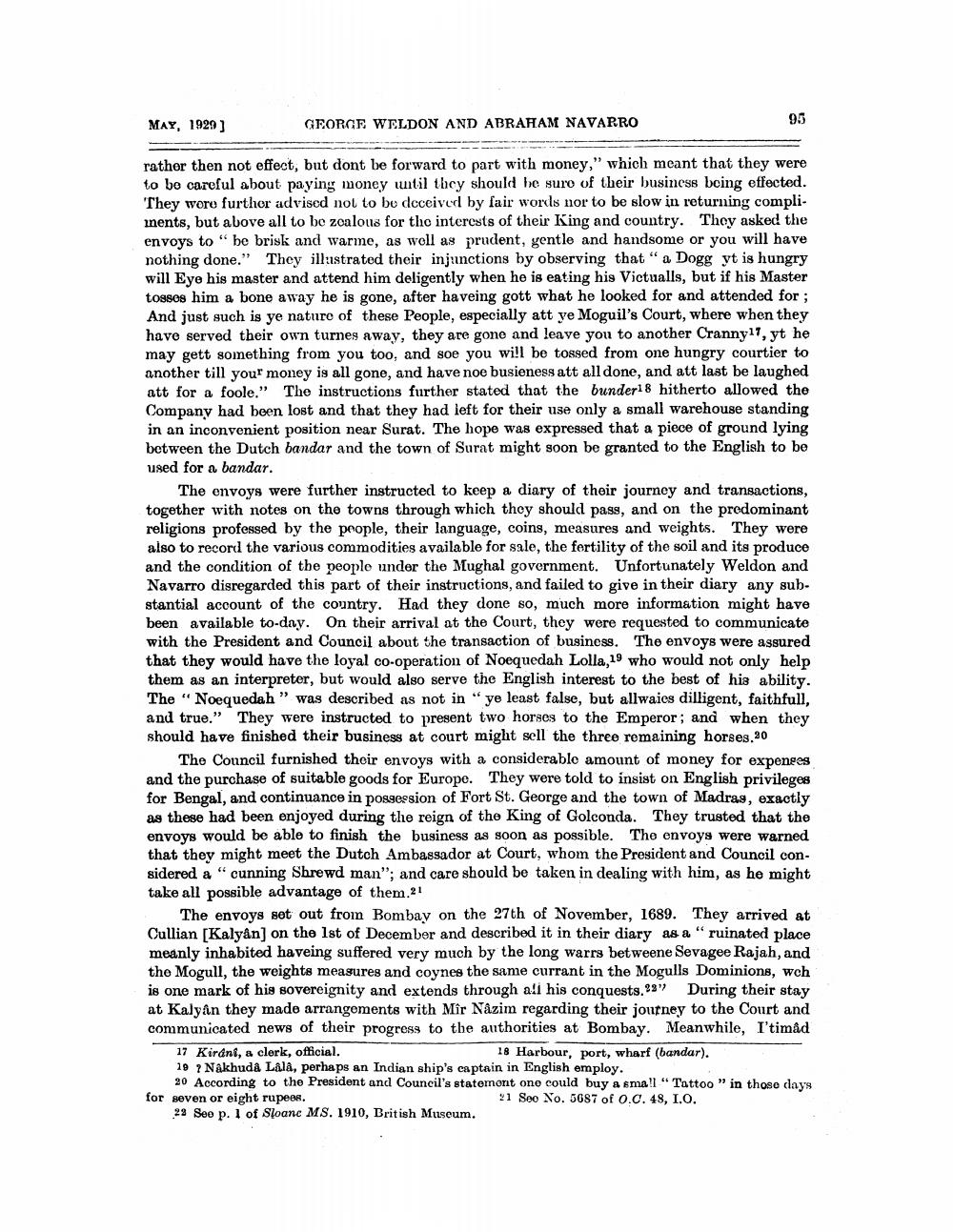________________
MAY, 1929)
GEORGE WELDON AND ABRAHAM NAVARRO
95
rather then not effect, but dont be forward to part with money," which meant that they were to be careful about paying money until they should be sure of their business being effected. They wore further advised not to be deceived by fair words nor to be slow in returning compliinents, but above all to bo zoalous for the interests of their King and country. They asked the envoys to "be brisk and warme, as well as prudent, gentle and handsome or you will have nothing done." They illustrated their injunctions by observing that “a Dogg yt is hungry will Eye his master and attend him deligently when he is eating his victualls, but if his Master tosses him a bone away he is gone, after haveing gott what he looked for and attended for ; And just such is ye nature of these People, especially att ye Moguil's Court, where when they have served their own turnes away, they are gone and leave you to another Cranny17, yt he may gett something from you too, and soe you will be tossed from one hungry courtier to another till your money is all gone, and have noe busieness att all done, and att last be laughed att for a foole." The instructions further stated that the bunderl8 hitherto allowed the Company had been lost and that they had left for their use only a small warehouse standing in an inconvenient position near Surat. The hope was expressed that a piece of ground lying between the Dutch bandar and the town of Surat might soon be granted to the English to be used for a bandar.
The envoys were further instructed to keep a diary of their journey and transactions, together with notes on the towns through which they should pass, and on the predominant religions professed by the people, their language, coins, measures and weights. They were also to record the various commodities available for sale, the fertility of the soil and its produce and the condition of the people under the Mughal government. Unfortunately Weldon and Navarro disregarded this part of their instructions, and failed to give in their diary any substantial account of the country. Had they done so, much more information might have been available to-day. On their arrival at the Court, they were requested to communicate with the President and Council about the transaction of business. The envoys were assured that they would have the loyal co-operation of Noequedah Lolla, 19 who would not only help them as an interpreter, but would also serve the English interest to the best of his ability. The "Noequedah " was described as not in "ye least false, but allwaies dilligent, faithfull, and true." They were instructed to present two horses to the Emperor; and when they should have finished their business at court might sell the three remaining horses.30
The Council furnished their envoys with a considerable amount of money for expenses and the purchase of suitable goods for Europe. They were told to insist on English privileges for Bengal, and continuance in possession of Fort St. George and the town of Madras, exactly as these had been enjoyed during the reign of the King of Golconda. They trusted that the envoys would be able to finish the business as soon as possible. The envoys were warned that they might meet the Dutch Ambassador at Court, whom the President and Council considered a "cunning Shrewd man"; and care should be taken in dealing with him, as he might take all possible advantage of them.21
The envoys set out from Bombay on the 27th of November, 1689. They arrived at Cullian Kalyan) on the 1st of December and described it in their diary as a "ruinated place meanly inhabited haveing suffered very much by the long warrs betweene Sevagee Rajah, and the Mogull, the weights measures and coynes the same currant in the Mogulls Dominions, wch is one mark of his sovereignity and extends through all his conquests.23" During their stay at Kalyan they made arrangements with Mîr Nazim regarding their journey to the Court and communicated news of their progress to the authorities at Bombay. Meanwhile, I'timad 17 Kirani, a clerk, official.
18 Harbour, port, wharf (bandar). 19 Nakhuda Lala, perhaps an Indian ship's captain in English employ.
20 According to the President and Council's statement one could buy a small "Tattoo" in those days for seven or eight rupees.
21 Seo No. 5687 of 0.C. 48, I.O. 29 See p. 1 of Sloanc MS. 1910, British Museum.




